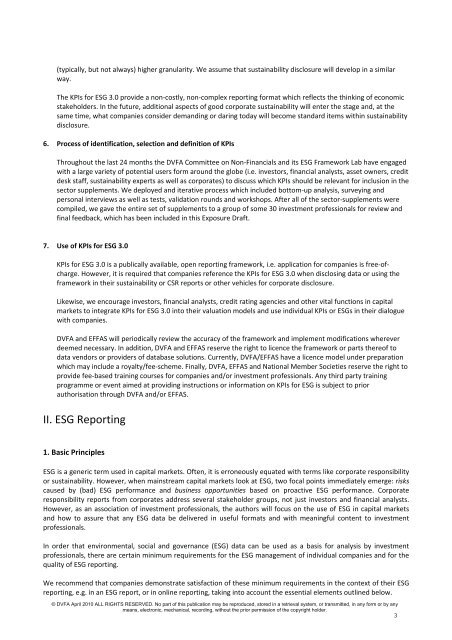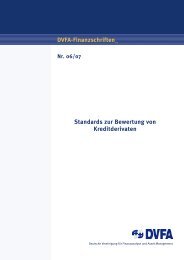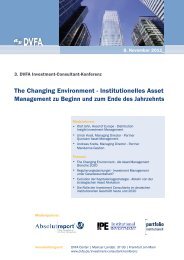KPIs for ESG - DVFA
KPIs for ESG - DVFA
KPIs for ESG - DVFA
You also want an ePaper? Increase the reach of your titles
YUMPU automatically turns print PDFs into web optimized ePapers that Google loves.
(typically, but not always) higher granularity. We assume that sustainability disclosure will develop in a similar<br />
way.<br />
The <strong>KPIs</strong> <strong>for</strong> <strong>ESG</strong> 3.0 provide a non-costly, non-complex reporting <strong>for</strong>mat which reflects the thinking of economic<br />
stakeholders. In the future, additional aspects of good corporate sustainability will enter the stage and, at the<br />
same time, what companies consider demanding or daring today will become standard items within sustainability<br />
disclosure.<br />
6. Process of identification, selection and definition of <strong>KPIs</strong><br />
Throughout the last 24 months the <strong>DVFA</strong> Committee on Non-Financials and its <strong>ESG</strong> Framework Lab have engaged<br />
with a large variety of potential users <strong>for</strong>m around the globe (i.e. investors, financial analysts, asset owners, credit<br />
desk staff, sustainability experts as well as corporates) to discuss which <strong>KPIs</strong> should be relevant <strong>for</strong> inclusion in the<br />
sector supplements. We deployed and iterative process which included bottom-up analysis, surveying and<br />
personal interviews as well as tests, validation rounds and workshops. After all of the sector-supplements were<br />
compiled, we gave the entire set of supplements to a group of some 30 investment professionals <strong>for</strong> review and<br />
final feedback, which has been included in this Exposure Draft.<br />
7. Use of <strong>KPIs</strong> <strong>for</strong> <strong>ESG</strong> 3.0<br />
<strong>KPIs</strong> <strong>for</strong> <strong>ESG</strong> 3.0 is a publically available, open reporting framework, i.e. application <strong>for</strong> companies is free-ofcharge.<br />
However, it is required that companies reference the <strong>KPIs</strong> <strong>for</strong> <strong>ESG</strong> 3.0 when disclosing data or using the<br />
framework in their sustainability or CSR reports or other vehicles <strong>for</strong> corporate disclosure.<br />
Likewise, we encourage investors, financial analysts, credit rating agencies and other vital functions in capital<br />
markets to integrate <strong>KPIs</strong> <strong>for</strong> <strong>ESG</strong> 3.0 into their valuation models and use individual <strong>KPIs</strong> or <strong>ESG</strong>s in their dialogue<br />
with companies.<br />
<strong>DVFA</strong> and EFFAS will periodically review the accuracy of the framework and implement modifications wherever<br />
deemed necessary. In addition, <strong>DVFA</strong> and EFFAS reserve the right to licence the framework or parts thereof to<br />
data vendors or providers of database solutions. Currently, <strong>DVFA</strong>/EFFAS have a licence model under preparation<br />
which may include a royalty/fee-scheme. Finally, <strong>DVFA</strong>, EFFAS and National Member Societies reserve the right to<br />
provide fee-based training courses <strong>for</strong> companies and/or investment professionals. Any third party training<br />
programme or event aimed at providing instructions or in<strong>for</strong>mation on <strong>KPIs</strong> <strong>for</strong> <strong>ESG</strong> is subject to prior<br />
authorisation through <strong>DVFA</strong> and/or EFFAS.<br />
II. <strong>ESG</strong> Reporting<br />
1. Basic Principles<br />
<strong>ESG</strong> is a generic term used in capital markets. Often, it is erroneously equated with terms like corporate responsibility<br />
or sustainability. However, when mainstream capital markets look at <strong>ESG</strong>, two focal points immediately emerge: risks<br />
caused by (bad) <strong>ESG</strong> per<strong>for</strong>mance and business opportunities based on proactive <strong>ESG</strong> per<strong>for</strong>mance. Corporate<br />
responsibility reports from corporates address several stakeholder groups, not just investors and financial analysts.<br />
However, as an association of investment professionals, the authors will focus on the use of <strong>ESG</strong> in capital markets<br />
and how to assure that any <strong>ESG</strong> data be delivered in useful <strong>for</strong>mats and with meaningful content to investment<br />
professionals.<br />
In order that environmental, social and governance (<strong>ESG</strong>) data can be used as a basis <strong>for</strong> analysis by investment<br />
professionals, there are certain minimum requirements <strong>for</strong> the <strong>ESG</strong> management of individual companies and <strong>for</strong> the<br />
quality of <strong>ESG</strong> reporting.<br />
We recommend that companies demonstrate satisfaction of these minimum requirements in the context of their <strong>ESG</strong><br />
reporting, e.g. in an <strong>ESG</strong> report, or in online reporting, taking into account the essential elements outlined below.<br />
© <strong>DVFA</strong> April 2010 ALL RIGHTS RESERVED. No part of this publication may be reproduced, stored in a retrieval system, or transmitted, in any <strong>for</strong>m or by any<br />
means, electronic, mechanical, recording, without the prior permission of the copyright holder.<br />
3

















